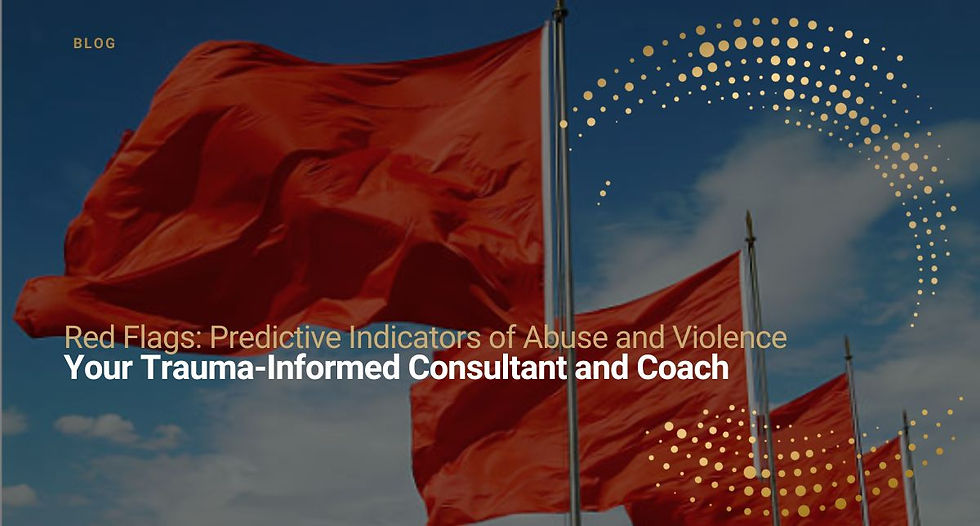The Hidden Costs of Frontline Work - And Ways to Safeguard.
- themothercorp
- Oct 20, 2025
- 4 min read

Safeguard your workforce with trauma-informed support
When we think of first responders, we often picture firefighters, police, or nurses. But transition house workers and those supporting survivors of gender-based violence are also first responders. Expanding our understanding of this term helps us recognize and better support these professionals, who face cumulative emotional and physical traumatic exposure in their work.
Health and safety include both mental and physical wellbeing. Research identifies five key aspects of occupational health: stress, satisfaction with work-life balance, burnout, subjective wellbeing, and physical health (Cerne, 2024).
Secondary and vicarious trauma occur when professionals absorb the trauma of those they support. Over time, repeated exposure can lead to personal trauma, showing up as sleep disturbances, nightmares, emotional exhaustion, flashbacks, reliving experiences, or feelings of helplessness. Without adequate mental health supports, burnout can accelerate.
When support is lacking—or when stigma prevents help-seeking—the risks compound. Trauma ripples into home life, peer networks, and organizational culture.
As one study on first responders exposed to trauma in the workplace noted,
“There was little support in place to protect their mental wellbeing and shared their frustrations with the ‘system and management’ in discussing the perceived lack of support available to them in the aftermath of dealing with traumatic work-related stressors” (Cogan, 2024).
[Article continued below]
Have you gotten my free Guides? Get them now

As a Trauma-Informed Consultant, Educator, and Coach I work directly with women living with violence and impacted by violence helping them get into better positions. I also train frontline staff, be it non-profit service providers offering programming for women or immigrants, in holistic trauma recovery, trauma-informed practices, red flags, gender-based violence, and high-conflict divorces.
Becoming trauma-informed is recommended in all sectors. Even the Harvard Business Review published We Need Trauma-Informed Workplaces in 2022.
The Mother Corp draws from my professional and academic experience along with my lived expertise. As such, I've put together six simple steps for frontline workers and their organizations to support building safer, more informed workplaces. These are ultimately a smart business investment in safeguarding your staff and organization.
Six Steps to Strengthen and Support Frontline Responders
1. Build Supportive Community
Connect regularly with trusted peers, create spaces for debriefing, and foster open conversations about stressors.
2. Take Feedback
Invite regular, anonymous feedback on workplace safety and support needs. Ensure safeguards so staff feel secure in speaking up without fear of repercussions. In smaller organizations, where feedback may identify individuals, emphasize clear protections. Celebrate feedback and its implementation as part of organizational culture, and where possible, co-create solutions with staff.
3. Create Onsite Health Embodiment Practices
Offer short, regular body-based practices such as mindfulness, breathing, or somatic grounding at the start of shifts, during lunch, or at shift changes.
These practices help reset the nervous system and improve resilience.
4. Bring in Outside Resources
Advocate for access to external supports—trauma therapists, coaches, or specialized trainers—to supplement internal resources. This requires dedicated budget lines to ensure availability. Research confirms that frontline workers make “very little reference to support specific to dealing with workplace trauma” (Cogan, 2024).
5. Implement Trauma-Informed Practices
Build and sustain a psychologically safe workplace. Cogan’s 2024 study recommends adopting a “strengths-based, non-pathologizing and de-stigmatizing approach to trauma in the workplace.”
Frame help-seeking as a strength, and build organizational culture that reinforces this.
Trauma-informed practices must begin with strong leadership and filter down through the organization. When leaders share their own experiences of seeking support for mental health challenges, it helps destigmatize the process and models resilience. Supervisors and management also play a pivotal role in removing barriers and ensuring fast-tracked access to resources.
6. Commit Organizationally to Wellbeing
Build clear, enforceable policies and practices that prioritize frontline wellbeing. Examples include adequate downtime after distressing events, ongoing trauma training, and scheduled compassionate check-ins.
In Conclusion
Safeguarding frontline workers is essential for sustaining healthy organizations and resilient communities. By embedding trauma-informed practices, encouraging open dialogue, and committing resources, we create environments in which those responding to trauma are also cared for themselves.
Supporting the supporters ensures their health, protects organizational culture, and ultimately strengthens the communities we all depend on.
Would your organization like trauma-informed education workshops?
The Mother Corp offers these topics in-person or virtually in a variety of durations:
Workshops are personalized to your organizations needs and can be for staff or for clients.
FOR PROFESSIONALS
For educational workshops and training, book your free consultation or
email themothercorp@proton.me (secure email).

ABOUT THE AUTHOR
Chavisa Horemans, MES, CDC, CTRC
Chavisa Horemans is a Trauma-Informed Coach, Consultant, and Educator helping people navigate complex situations.
She holds an interdisciplinary Master’s degree in social sciences and a Graduate Diploma in adult education.
Chavisa is a Certified Divorce Coach (CDC, International Coaching Federation Member and American Bar Association Member), specializing in supporting women, often mothers, involved in high-conflict disputes and complex situations.
Her areas of expertise include High-Conflict Divorce, Gender-Based Violence, Hidden Abuse, Financial Abuse, and Post-Separation Abuse.
She is also a certified holistic Trauma Recovery Practitioner (CTRC), helping individuals process and recover from trauma. She continues to deepen her knowledge through ongoing training in trauma-informed interventions.
Contact Chavisa at themothercorp@proton.me, or text/call 778 926 8134.



Comments